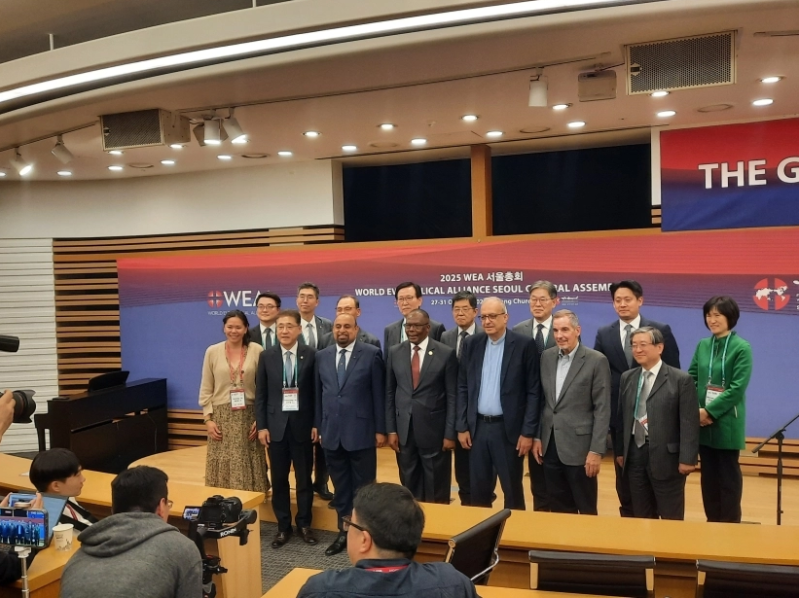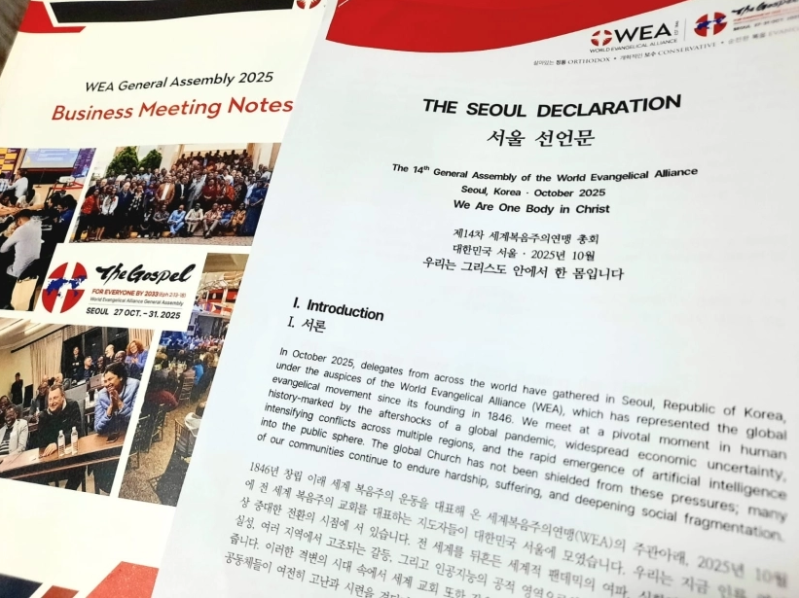
The World Evangelical Alliance (WEA) has released the Seoul Declaration, a 15-page statement reaffirming core evangelical beliefs and offering pastoral guidance on complex social and moral issues. The document was introduced during WEA’s 14th General Assembly, held October 27–31, 2025, in Seoul, where 850 delegates from 124 countries gathered.
Background of the WEA and the Seoul Declaration
Founded in London in 1846, the WEA is the world’s largest and oldest evangelical alliance, representing an estimated 650 million evangelicals in 146 countries. The Seoul Declaration was developed through dialogue between Korean scholars and WEA representatives to restate orthodox evangelical convictions and address contemporary challenges facing churches worldwide.
Drafting and Approval Process
At an October 30 press briefing at Sarang Church, a WEA spokesperson said work on the declaration began in January 2025, after Seoul was selected as the assembly host city. An eight-member committee of theologians and scholars appointed by WEA drafted the text, which underwent several revisions before the final version was completed in early October. The WEA International Council reviewed and approved the document on October 27, releasing it publicly the same day. It was then endorsed in principle by delegates during an internal plenary on October 30.

Core Themes of the Declaration
The declaration’s theme, “We Are One Body of Christ,” centers on the absolute authority of Scripture and sets out clear positions on religious pluralism, syncretism, and liberal theology. It voices strong concern over threats to religious freedom and democratic values, and calls the global church to unite in advocating for women, children, vulnerable communities, and persecuted believers. It also articulates a biblical stance on homosexuality.
Affirmation of Gospel Essentials
Opening with a summary of gospel essentials—“God is the Creator and Lord of history; Scripture is the inerrant Word of God; salvation comes only through Jesus Christ; and the Holy Spirit is actively at work today”—the declaration prioritizes evangelism and discipleship as the church’s primary mission. In its “We Affirm: Our Shared Faith” section, it describes the gospel as truth for everyone, affirms Scripture’s transforming power, and warns against religious pluralism and syncretism, urging “cooperation without compromise.” It reiterates that humanity is made in God’s image—men and women equal in dignity and value—and defines marriage as the sacred covenant between one man and one woman.
Pastoral Guidance on Homosexuality and Church Conduct
The document urges churches to be places where grace and truth meet, stating that “homosexual behavior is sin and contrary to God’s design for human sexuality,” while stressing a pastoral posture: “We proclaim this truth not to condemn but out of love, to bring hope, healing, and freedom from Christ.” Churches are encouraged to listen humbly, walk empathetically, and serve with biblical clarity and gentleness. It further commits to stand with evangelicals worldwide against ideologies that suppress religious freedom or distort a biblical view of humanity, while proclaiming Christ in love.
Prayer and Appeal for Korean Peninsula Reconciliation
Addressing the ongoing division of the Korean Peninsula, the declaration contrasts South Korea’s freedom to receive the gospel with severe religious restrictions in North Korea and prays for reconciliation: “We earnestly pray for God to bring reconciliation, that all peoples may freely worship and obey His truth. We ask His mercy on North Korea: end all systemic human rights abuses and free those unjustly imprisoned.”
Commitment to Gospel-Shaped Action
Concluding with “We Commit: A Call to Gospel-Shaped Action,” it aligns WEA with the “Gospel to Every Person by 2033” initiative and outlines seven priorities—mission, discipleship, environmental stewardship, ethical technology, and more—calling believers to Spirit-empowered, Christ-centered, Scripture-grounded discipleship.
Pending Final Approval and Next Steps
While broadly endorsed, the declaration is not yet final. Several national alliances requested additional time for review. Delegates agreed to a one-week window for written feedback, with any amendments to be confirmed by electronic vote. Photos released from the assembly include the new Secretary General, the International Council Chair, and members of the Korean theological committee.






